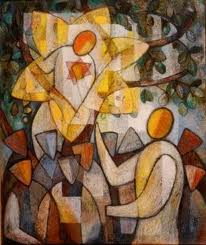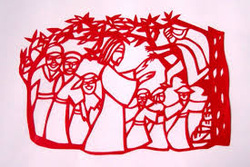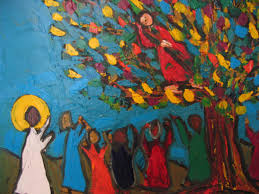 Do you find Zacchaeus (Luke 19) as endearing a character as I do? Here are my notes from digging into commentaries this week. A resource list is at the end. As usual, my kibbitzing/comments are in italics! Characters: 1) Jesus is having his last encounters with outcasts before his entry into Jerusalem. He has just healed a blind beggar. He speaks to Zacchaeus using the divine imperative, "must/dei." Jesus restores Z’s dignity by coming to his house. (Today we don’t invite ourselves to other people’s homes, how does that effect how we read this story? What would we do if someone looked us in the eye and said, I'll be right over for dinner?). 2) Zacchaeus means “pure, righteous.” This greek form is used twice in scripture: first, a Maccabean Officer (2 Macc.10:19), second, the Chief Tax/Toll collector in Luke 19: 1-10. The Hebrew form, Zakkai, means clean, innocent. (Neh. 7:14, Ezra 2: 9). The term for Chief tax, or toll, collector is architelones. This is the only use of the term in all of Greek literature. Zacchaeus is a wealthy, chief tax/toll collector, who sacrificed his dignity by running and climbing a tree. Tradition says that this Zacchaeus became bishop of Caesarea, appointed against his will by Peter. (O’Toole) Tax colletors, Telones , would be stationed in toll booths to collect customs duty on goods being transported into the territory. Also translates as “farmer”, a reminder that production was sometimes levied. (O’Toole) "Telone" is related to "telos," something paid for the purpose of the state. In Galilee, Tax colletors worked for officials of the Jewish client king. In Judea (Where Jericho is) worked under Roman prefects. Types of taxes: Roman head (poll), land, transport of goods. Jews: temple, produce for support of priests. In Greek and Roman literature, authors inclued tax collectors in lists with beggars, thieves, robbers, tax collectors. Early Rabbis included in lists with robbers, murderers, sinners as one of the despised trades that no observant Jew should follow (Donahue). Z is under contract to Romans, running a fanchise. K: Who are you working for? What is your end, purpose, telos? Is this story in part about repurposing, redirecting the purpose we serve? Z. resolves to do all the good he can and (implicitly) to do no harm. He changes franchises. Table Fellowship with such is so outrageous some scholars have questioned whether Jesus really did it. Repentance thought to be particularly difficult since they tended “to enrich themselves through dishonesty.” (Donahue, p. 388) Making this a great passage for communion Sunday! Because Z is a rich tax collector, people would have assumed that he was lining his own pocket at others’ expense (Ringe p. 232). We readers know by now that Jesus is favorably disposed to those others have poor opinions about. While its never clear that Z ever committed fraud, it IS clear that he gave more than Torah required of someone who had (original amount plus 20%) Compare with half given in 3:11/John the Baptist. “Because of his political and economic role as a chief tax collector, Zacchaeus has never been in a position to consider membership in the people of God something he can presume. (p. 233 Ringe) K: Those who can or do presume have the most difficulty. Of course Jesus saw him. Everyone must have been looking at this (short) grown (important) man first running like a child then in his undignified position up that tree. Some may have been pointing. We think of status shrinking when we are humbled, but Z is raised up, (by Jesus when he comes down from the tree), not bent low with shame. 3. The Crowd is between Jesus and Zaccheus (as not long before with children and then a blind beggar). Who gets between us and Jesus? Who do we get in the way of? Jesus followers must always be noticing. We both invite and prevent. Look for other places the crowd grumbles. Location: Jericho, near the Jordan fords used by traders. An important customs station between Judea and areas east of Jordan River. Sycamore Trees grow up to 60 feet, taller than your average fig tree. Clusters of small fig fruits, edible but not delicious, grow through the tree bark and low branches. K: foot holds? Fruit was food for the poor (and a laxative). The wood quality is soft, white, not as valuable as cedar but useful in a land where wood is in short supply. It is light and porous, used in mummy coffins, furniture, boxes, doors (Jacob & Jacob). Evergreen leaves are thick enough to hide someone. Sets up a comedic scene whose mood will suddenly shift ot serious transformation. (Ringe) When: Luke uses the term “today" (semeron) 11 times (compared with once in Mark). K; Neil Diamond’s “Today" starts running through my head. Here are 10, where is number 11?:
My New Questions: Jesus addressed him by name. Did Z’s reputation precede him? What is at stake for Jesus in “requiring hospitality from a sinful man?”[1] How do sinners “come home,” find a place at the table? What would an equivalent be today, unpopular? Who is too close for us to see” (Jesus was too close for those he grew up with to see, Prodigal’s older brother, Martha, Luke 18 Pharisees…) familiarity breeding contempt? Observation: This is another turning of the tables (compare with the temple scene coming up soon in Jerusalem) Compare: Luke 3: 12 toll collectors and John the Baptist Luke 5: 27-32 Levi, one of those Jesus called, was a tax collector. Luke 7: 29-34 Toll collectors baptized by John Luke 8:3 Luke 13:16 Luke 15: 1 parable Luke 18: 9-14 compares favorably with Pharisee praying in temple. “Those who humble themselves will be exalted.” K: And this week, here he is! (first is parable, now is in the flesh. Contrast: Luke 18: 18-30 rich (sad) ruler vs. rich (enthusiastic) tax collector. Z’s response to Jesus is eagerness to do what is right for the poor pouring out of the Joy of being free. Thematic Elements: Calling, controversy, conversion, salvation (Nolan) Repentance (Powery) K: replaces guilt Z is lost. In Luke, Jesus is sent to find the lost, disadvantaged. Seeking, seeing, salvation are Jesus' actions. Sought, seen, saved is Z's experience. Begins with Z’s action, moves to J’s. (O’Toole) Note shift in tone from urgency to assurance. Can we trust Z’s change? Who do we find it hard to trust when we see changes in them? Z puts aside 2 potential barriers to grace: /reputation, wealth Stewardship: “Zacchaeus is a model for generous patrons of house assemblies, damping down disputes about the rich retaining some of their wealth.” (Nolan) How are notions of wealth different between that time when identity was more communal and now when identiy and wealth are privitized. Impediments to progress: (Culpepper) Pessimism-nothing happens here/anymore/to me. Knowing people cannot change. (Culpepper-“enslaving prejudice”). Jesus stopped for ONE person. “Today came for Zacchaeus because he wanted to see so badly that he ran and climbed a tree.” Practices: Jesus initiates the evangelization of households involving shared meals. (Nolan) Resources: The New Interpreter’s Dictionary of the Bible, Vol 5 page____ “Zacchaeus” Article by Brian M. Nolan The New Interpreter’s Dictionary of the Bible, Vol 5 p. 477, “Tax Collector” article by Emerson B. Powery The New Interpreter’s Dictionary of the Bible, Vol 5, p. 410 “Sycamore” F. Nigel Hepper. Anchor Bible Dictionary, volume 6, p. 1032. Zacchaeus, Robert F. O’Toole Anchor Bible Dictionary, volume 6, p. 337, “Tax Collector,” John R. Donahue Anchor Bible Dictionary, volume 6, p. 808, “Sycamore Fig” Irene Jacob, Walter Jacob Westminster Bible Companion Series, Luke, Sharon Ringe New Interpreters’ Bible vol. 9, R Alan Culpepper, pp. 356-360. [1] Brian M. Nolan
0 Comments
 paper cut by Huibing He paper cut by Huibing He Luke 19:1-10: Zachaeus He entered Jericho and was passing through it. A man was there named Zacchaeus; he was a chief tax collector and was rich. He was trying to see who Jesus was, but on account of the crowd he could not, because he was short in stature. Zacchaeus was a “big man” who was too short to see. So he ran ahead and climbed a sycamore tree to see him, because he was going to pass that way. Zacchaeus saw where Jesus was headed and went there. Can we see the direction Jesus is headed? What would it take for us to run ahead and meet him there? When Jesus came to the place, he looked up and said to him, "Zacchaeus, hurry and come down; for I must stay at your house today." Would Zacchaeus ever have spoken to Jesus? Why not? Where does Jesus' senes of urgency (must) come from? So he hurried down and was happy to welcome him. All who saw it began to grumble and said, "He has gone to be the guest of one who is a sinner." What is it about grumbling that unifies us? At this point in the story the word "all" forces us to ask which character we identify with and why. Zacchaeus seems to be silenced by public opinion, locked down in battle between the power of money and the power of communal identity and acceptance. Does "everyone" minimize Z’s relationship with them to punish him? The story becomes a matter of retributive vs. restorative justice. How does someone get to be a tax collector? Enslaved by success? Who might be equivalent victims of success today? Think about time in place of money. Who controls our time? St Francis was known for being free of the love of money. Was he also free to use his time as God led him? What would it look like to today to be free of the tyranny of time and money? Who are saints we’ve known who embody Christ’s freedom in this way? Zacchaeus stood there and said to the Lord, "Look, half of my possessions, Lord, I will give to the poor; and if I have defrauded anyone of anything, I will pay back four times as much." Is that all it took? This sounds so easy. Why was he so ready for such radical change? The story began with urgency: trying to see, ran ahead, hurry, hurried…until Zacchaeus “stood there” when Jesus reached his house. Then Jesus said to him, "Today salvation has come to this house, because he too is a son of Abraham. Zacchaeus, who controlled our money as chief tax collector, is one of us, our family. How did the crowd react? Ws it a a case of "the longer we grumble the harder we fall?" For the Son of Man came to seek out and to save the lost." Those of us who forget God is saving us in our lostness find ourselves grumbling instead of rejoicing, feels like privileges violated (see prodigal son). Does anger become a privileged possession if we refuse to give it up? Whose house would we rather Jesus didn't visit, much less stay at? This story’s strangeness comes from the way Jesus looks at a rich man and instead of challenging him to give up his cash, invites himself to the man’s house, (which upsets everyone in the crowd), then witnesses and affirms the man's radical transformation. Its another open ended story. How do we all feel about the transformation of someone we've learned to love to hate? |
Karen L MunsonThese posts share initial thoughts on the preaching text for each week's worship. Early in the week are "gut reactions" Later in the week, gleanings from study. Please join the conversation by adding your observations and comments of the text in the comment box. The Scripture is in regular font and my thoughts are in italics. ArchivesCategories |

 RSS Feed
RSS Feed